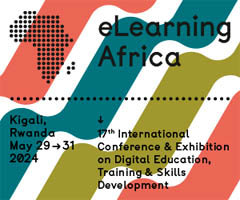Portugal's Road Towards Lisbon 2010
 Lisbon (PT), October 2007 - As its name in Portuguese indicates, the FDTI - the Foundation for the Promotion of Information Technologies - is responsible for disseminating ICT knowledge and use in Portugal, and the organization was, naturally, one of the institutions responsible for the recent EU Conference on Delivering the Lisbon Agenda. During the eLearning Lisboa 2007 event, CHECK.point eLearning had a chance to speak with Patricia Leão from the FDTI.
Lisbon (PT), October 2007 - As its name in Portuguese indicates, the FDTI - the Foundation for the Promotion of Information Technologies - is responsible for disseminating ICT knowledge and use in Portugal, and the organization was, naturally, one of the institutions responsible for the recent EU Conference on Delivering the Lisbon Agenda. During the eLearning Lisboa 2007 event, CHECK.point eLearning had a chance to speak with Patricia Leão from the FDTI.
What is the FDTI and what are its goals?
Patricia Leão: The Fundação para a Divulgação das Tecnologias de Informação was founded in 1991 by the Portuguese Institute for Youth and the Portuguese Institute of Training and Employment. Our values and goals are the promotion of digital inclusion by training and qualifying our population in IT, as well as I&D projects, and the dissemination of IT around the country.
Our main target is youth, but as time goes by we attend to new target groups, such as seniors and disabled people with special needs, and also to new needs, which include, for example, lifelong learning to adults.
What have you achieved so far?
Patricia Leão: Today we have an FDTI Delegation in each Portuguese District, including Azores and Madeira, and 150 training centres and mobile structures, covering the entire national territory. Due to this national coverage, we are able to train and qualify around 90,000 people per year.
What role does the FDTI play in the Portuguese strategy of the Lisbon 2010 agenda?
Patricia Leão: First of all, we are aligned with the strategy of Portuguese Technological Plan, concerning technological national policies.
Our role in the Lisbon Agenda addresses three main issues: knowledge, technology, and innovation. Within these, we promote digital and social inclusion, lifelong learning, employment, entrepreneurship, and innovation processes.
Would you say the eLearning Lisboa conference 2007 is a turning point for eLearning in Portugal, and what do you expect of it for the future?
Patricia Leão: Yes, the conference was really important, and it had a very positive impact. It raised the awareness of all stakeholders: schools, training institutions, universities, companies, and public agencies, as well as decision makers. The conference may have been a turning point in that it discussed how technology leads us to training, education, and innovation processes. Technology and communication play a role that should be understood in a broader perspective, comprising formal, informal, and non-formal learning ... and these, in turn, include many components, for example about information sharing. blogs, networking ...
What will be the FDTIs next steps to reach the goals of the Lisbon 2010 agenda?
Patricia Leão: As FDTI has a strong commitment to the goals of the Lisbon Agenda, we will continue to pursue our purposes and seek to be able to identify new needs. And of course, we will also continue to update our programs systematically as well.
We will keep on going with some important projects, such as digital literacy, senior training, lifelong learning projects, and entrepreneurship programs. And last but certainly not least, we will concentrate on our core task: the dissemination of IT, that is, bringing the IT message to an ever-growing number of Portuguese .









